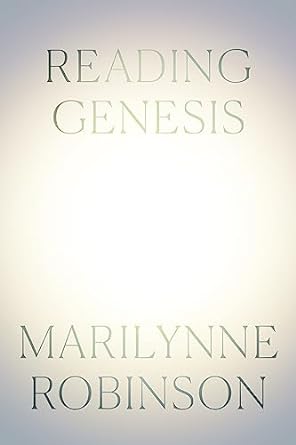For mid-summer we will begin discussing the provocative and inspiring Reading Genesis by Marilynne Robinson. This group meets bi-monthly via Zoom on Thursday afternoons., 4:00 – 5:15 p.m., beginning July 25. Contact Marie Highby [mhighby@gmail.com] for more information and Zoom link!

No One Has Ever Read Genesis Like This
The Pulitzer Prize-winning novelist Marilynne Robinson delivers a riveting interpretation of the Bible’s first book.
NY Times Book Review by Francis Spufford March 6, 2024
Marilynne Robinson’s “Reading Genesis” is a writer’s book, not a scholar’s; it has no footnotes. Its power lies in the particular reading it gives us of one of the world’s foundational texts, which is also one of the foundations of the Pulitzer Prize-winning author’s mind and faith. We want to know what Robinson thinks of Genesis for the same reason we’d want to know what Tolstoy thought of it.
There are the specific judgments she’s going to make, but there is also the fascination of seeing what happens when she applies the sensibility that made the novels “Gilead” and “Housekeeping” directly to the Scripture that, millenniums ago, in a genre of writing very different from realistic fiction, inaugurated the vocabulary of faith that her imagination draws on today.
A woman pins up a bedsheet to dry in the wind in “Housekeeping,” and “the throes of the thing were as gleeful and strong as if spirit were dancing in its cerements.” The closeness of spirit to wind, the conviction that there is a pulsing life in the world that can make even dead things get up and boogie: All that begins in Genesis, genealogically speaking. The spirit of God moves on the face of the waters, and eventually, far off in Idaho, the novelist’s bedsheets stir.
But the surprising thing about “Reading Genesis,” given that it’s by a writer who can make even nonbelievers feel the presence of the thing they disbelieve, is that it is hardly interested in the numinous. The sublimity of the Creation story, the strangeness of Jacob
wrestling with an angel (or maybe God himself), Abraham’s fearful vision of darkness — all of these are here, but briefly, sideshows to her main focus, which is on Genesis as a close-up account of one human clan. This is a chronicle, made extraordinary by the chroniclers’ assurance “that out of the inconceivable assertion of power from which everything has emerged and will emerge there came a small family of herdsmen who were of singular interest to the Creator.”
The Bible, Robinson says in her very first sentence, is a “theodicy,” a justification of the ways of God. And Genesis’ part in that, in her view, is a demonstration of how human freedom can coexist with divine foreknowledge, with a covenanted plan. The descendants of Adam and Eve wander, murder, screw up, get drunk immediately after their most impressive actions, cheat one another out of blessings, engage in a spot of polyamory and then viciously regret it, do harm on the grand scale while doing good on the local one. (Robinson points out, which most commentators do not, that Joseph, while reconciling with his brothers, also contrives to enslave the entire population of Egypt for the pharaoh.) Yet all the while, the faithfulness of God nudges the actions of these fallible people along the path toward law, justice and mercy.
To Robinson, there is no conflict of scales. “Modest domestic turbulence,” details “as quotidian as dust,” coexist with a God’s-eye view we can’t share ourselves but whose consequences we continually witness. To her, Genesis is a narrative exposition of this truth: not an argument, but a psychologically subtle story to the same effect, making wholly deliberate use of repetition, variation, framing and echoing.
She is aided in this claim by a strong conviction that Genesis as we have it is written, through-composed as a document rather than assembled from discrete materials Frankensteined together. “I imagine a circle of the pious learned, rabbis before the word, remembering together what their grandmothers had told them, finding the loveliness of old memory in an odd turn of phrase,” she writes, and envisions them able, thanks to the Holy Spirit, to act together as a kind of collective artist, to tell one story, to one end.
She thinks of the whole Bible this way, each new book, onward through the Law and the Prophets and very much including the New Testament, developing the narrative “with a full awareness of the text as it existed to that point” and able, by grace, to continue in harmony with it. This is a doctrine of Scripture that takes human authorship completely for granted, as a liberal interpreter would, and that reads “ta biblia,” “the books,” as being truly one book — one gift to humanity with a single redemptive aim — the way a conservative interpreter would. If you mapped Robinson’s novelistic reading onto contemporary scholarship of the Bible, you’d find her in several camps at once. Maybe grace is, too.
There are some arguable points. Robinson’s depiction of law as a framework of instruction that is up to us to keep or break is extremely modern and individualistic, and doesn’t square with the enforced tribal behavior of the Mosaic code. In the same way, her confidence that “one is, with God, the only possibly competent judge of one’s own spiritual state” seems to populate the ancient desert with rather anachronistic Calvinists. And occasionally, she is so determined, in her vindication of God’s good intentions, not to let any barbarous or primitive elements into her portrayal of him that you get the whiff of one of those liberal sermons in which the lake of unquenchable fire sweetly transmogrifies over five minutes into a pool of milk and honey.
These are the idiosyncratic incidentals of a genuinely idiosyncratic reading. Against them, there is the tough-minded continual splendor of Robinson’s attention to Genesis’ figures in the landscape. And there is her affirmation that the foreground, where the sheep baa around the tattered tents and men and women muddle their way onward to the Promised Land, backs onto the immensity that spoke the cosmos into being.
READING GENESIS | By Marilynne Robinson | Farrar, Straus & Giroux | 344 pp


